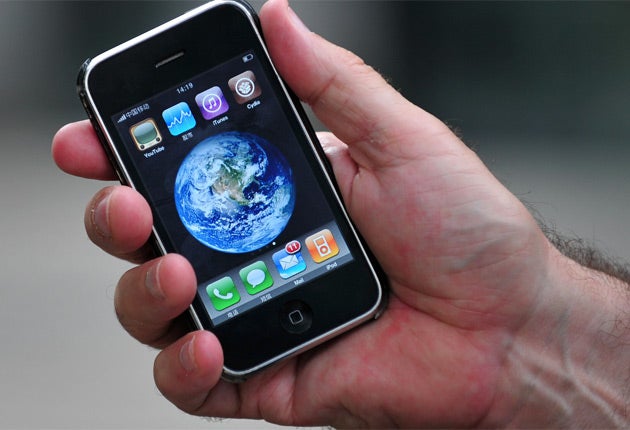Carola Long: Human contact? I'll bet there's an iPhone app for that
They make people impatient, and rob experiences of their spontaneity.

"iPhones are killing the conversation on the front row," asserted one fashion editor after the recent Milan shows. And guess what? Her comment wasn't a tweet, or a blog post or a text message. She actually said it out loud, to me, in conversation. Anyone remember that?
The people-watching afforded by the front row is as fertile as conversation fodder comes, but this season the idle but fascinating chat that used to be struck up between two people who didn't know each other, thrown together on a tiny bench packed tighter than Anna Wintour's suitcase for Paris Fashion Week, had dwindled. Old friends still chatted but that casual conversation between strangers had all but vanished. Instead of gossiping to their neighbour that, say, someone in the crowd's outfit cost more than a family car, many of the audience were furiously tapping away on their iPhones. Some were tweeting; some may have been answering genuinely pressing emails; some may have been playing with that bubble wrap-popping app but others were using their phones as instruments of isolation that say "don't even think about talking to me" better than the sourest of pouts. When the lights went down at the Dolce & Gabbana show there should have been a thrilling moment of silence and darkness before the catwalk bursts into light and sound. Instead, glowing in the gloom, like the lighters held aloft at a concert, were the bright screens of several hundred BlackBerries and iPhones in use.
I appreciate that iPhones are useful and, for many work situations, essential. I am even considering confronting my chronic Luddite tendencies by being one of the last people on earth to join Facebook and Twitter, although I quite enjoy the instant camaraderie of meeting someone else in this beleaguered band. I get that the iPhone represents progress. However, just as President Sarkozy suggested that a country's prosperity shouldn't just be measured in GDP, but also in a joie de vivre index, it doesn't matter how many useful apps you can download (not to mention the not so useful ones, such as iBeer), or how quick and wide reaching your internet connection is, if this little ergonomic tyrant is running your life and ruining your personal relationships. To paraphrase Princess Diana – there are three of us in my relationship: me, my boyfriend, and the new love of his life with curves to die for, the iPhone. It sits next to us on the sofa, the restaurant table, beside the bed, on the beach. Maybe he doesn't really like me, or it's a dog substitute. Either way, it's there flashing constantly like some sort of needy spaceship, fuelling his addiction.
The advent of the BlackBerry meant that people's jobs spilled over into their personal lives, but now the fun factor of the iPhone means that many more are now leading double lives, real and virtual. Whatever happened to living in the moment? On a recent visit to Edinburgh, my boyfriend and I were trying to find our way to the hotel, but instead of meandering through the streets discovering the city's unexpected treasures we had to consult some hi-tech map device, then proceed 500m forward, 300 to the left, etc. Then there was finding a restaurant. Forget spontaneity: the local eateries for miles around were duly Googled and assessed in the street. Perhaps we missed some kind of virtual tasting app that we could have downloaded to experience our future meal for us.
While we were staying in Edinburgh I sent my friend a real, live postcard. How retro, given that there is actually an iPhone postcard app. What was less retro was the feeling several hours later that I should have had a reply. We've all become so used to instant messaging that the idea of sending a postcard and not getting an instant reaction was frustrating. These appealing, addictive devices inveigle their way into your consciousness and distort your perception of time and distance. They make people impatient, and rob experiences of their spontaneity. They are anti-joie de vivre. The thing is, I really want one, and that's the saddest bit.
Carola Long is deputy fashion editor of The Independent
Subscribe to Independent Premium to bookmark this article
Want to bookmark your favourite articles and stories to read or reference later? Start your Independent Premium subscription today.

Join our commenting forum
Join thought-provoking conversations, follow other Independent readers and see their replies